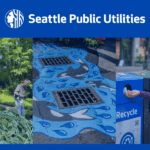
City led nation when it pioneered curbside recycling in 1988
 All across the country, it’s America Recycles Day, and this year marks Seattle’s 25th anniversary of citywide curbside residential recycling.
All across the country, it’s America Recycles Day, and this year marks Seattle’s 25th anniversary of citywide curbside residential recycling.
In 1988, Seattle became one of the first major cities in the nation to provide curbside collection of recyclables. Twenty five years later, there are now more than 8,000 municipal curbside recycling programs in the United States. Seattle’s recycling program has been recognized around the world by such organizations as by the National Recycling Coalition, the Solid Waste Association of North America, the American Forest and Paper Association, as well as Harvard’s Innovations in American Government Award.
In the past 25 years, Seattle single-family residents:
- Recycled 1.7 million tons of material, enough to fill two city landfills.
- Recycled 15,000 tons of aluminum, enough to build more than 200 Boeing 747s, or produce 1 billion aluminum cans, which, if laid end-to-end, would circle the Earth three times.
- Recycled 551,000 tons of newspaper, which saved the equivalent of a 9 million-tree forest from being harvested.
- Recycled 1.2 million tons of paper, equal to 240 billion sheets of office paper, which, if laid end-to-end, would run from the Moon to the Earth and back 8 times.
- Recycled more than 3 tons of material per person, on average. That’s the equivalent of each person in Seattle recycling a Ford F150 pickup truck.
- Saved more than $68 million in avoided landfill disposal fees.
In the past 25 years of recycling, Seattle residents saved 3.1 million metric tons of greenhouse gases from being emitted into the atmosphere, which is the equivalent of:
- Taking 625,000 cars off Seattle’s roads for a year.
- Powering every single-family home in Seattle for an entire year.
- Consuming 6.9 billion barrels of oil or 336 million gallons of gasoline.
Founded in 1997, America Recycles Day is the only nationally recognized day dedicated to encouraging Americans to recycle and buy recycled products. According to the U.S. Environmental Protection Agency, Americans recycled or composted 34.7 percent of all the waste they generated in 2011.
By comparison, Seattle recycled and composted 55.4 percent of its waste in 2011. In 2012, the city’s recycling rate was 55.7 percent. Seattle single-family households currently recycle and compost more than 70 percent of the waste they generate.
Still, there’s more Seattle can do. The city’s goal is to divert 70 percent of the waste it generates to recycling and composting by 2025. Currently, nearly half of Seattle’s garbage is made up of compostable food waste and recyclable paper. Seattle recently banned bottles and cups from commercial garbage, and is considering switching to every-other-week garbage collection as well as banning food waste from residential garbage in 2015.
